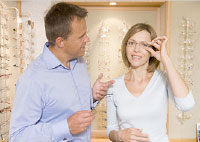
|
We've all heard the old adage that listening is twice as important as speaking, as shown in the fact that humans have two ears and only one mouth. I believe as Opticians listening should be thrice as important and maybe all opticians should have three ears and only one mouth. Here are some things to remember when it comes to really listening to your patient.
Knowing What to Listen For
Often our patients don't know exactly how to express or explain exactly what is bothering them. If we aren't fully listening to their description of what is going on, we may miss out on the opportunity to help solve their problem. (Yes, this is an opportunity, not an inconvenience.)

|
Think of it, how many times have you had a patient say "These glasses are digging into my nose" and you know as an Optician this means "Check the splay of the nosepads." Or when your patient says, "I feel like I've got to tilt my head down to see the distance" it means "Check the position of the progressive lens." When your patient comes in with a list of inconveniences you can't easily decipher, how do you determine how to proceed?
Ask the Right Questions
When you have a patient who is having issues that are not easy fixes, be prepared to ask several questions and to really hear the answer they are giving. Allow one question's answer to become the start of another question and let the conversation flow from there. Don't forget to repeat to the patient what your findings have been as a summary of the conversation and to ask the patient if you are correct in your understanding of their issues. As we have already established, often times a patient won't know exactly how to express their issue and you don't want to put words in their mouth. The more information you can gather from the patient, the more information you will have to help solve their issue.
Patience is Key
Sometimes a patient won't want to hurt your feelings or admit it but they just don't like the frame they selected and they won't know how to tell you. If you ask the right questions and you're prepared to hear the answer you will be able to best help your patient. Remember; don't take the patient's issue personally. The glasses they selected are the cause of their discomfort or issue, not you personally. The worst thing to do would be to get defensive because the patient is having an issue. Be there to help the patient, not to combat them.

|
Active Listening
Being able to participate in the conversation with your patient is incredibly helpful in helping to solve their problem. Let them know you are there to help. You are both on the same team and you would like for them to tell you about their experience. Again, truly listening to the patient for those unsaid keys will help you unlock the answer to their issue. When you can easily decipher and fix the patient's problems you become the WOW experience that your patient is desperately seeking. Talk about a win-win situation. Listen when your patient speaks and find yourself solving problems left and right and creating happy and loyal patients.













